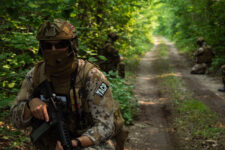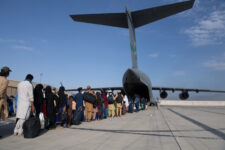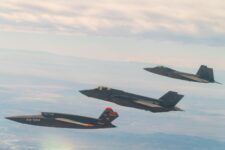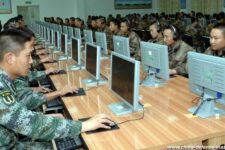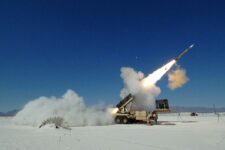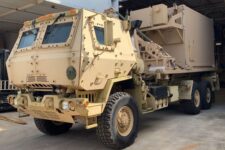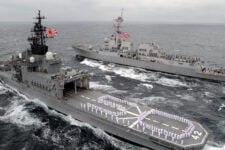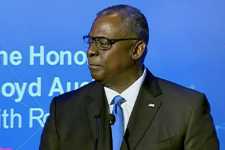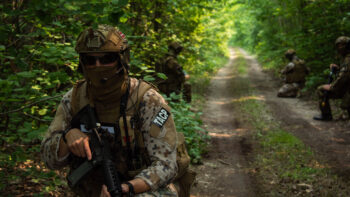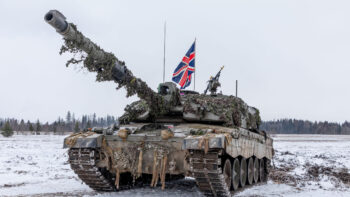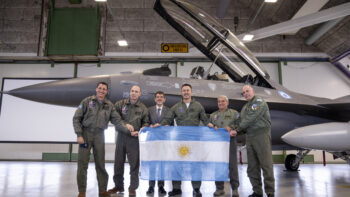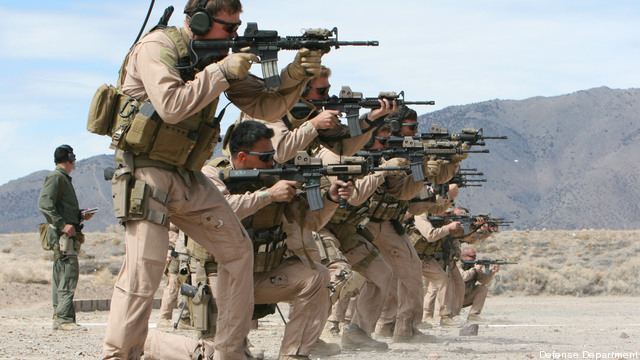 WASHINGTON: When Linda Robinson speaks, special operators listen.
WASHINGTON: When Linda Robinson speaks, special operators listen.
The “silent professionals” are — for good reason — traditionally tight-lipped. The chief of Special Operations Command, Adm. William McRaven, proved that again today during a panel at the Wilson Center, giving eloquent non-answers to questions about what might transpire in Syria, Afghanistan, and Yemen. But McRaven made it clear that if you want to know what he’s really thinking about the future of SOCOM, you’d better pay attention to the panelist who sat two chairs down: former Central Command advisor and bestselling David Petraeus biographer Linda Robinson.
“Frankly, folks throughout the special operations community listen to Linda Robinson,” McRaven said. “I listen to her.”
McRaven can be a courtly fellow, pulling out Wilson Center CEO Jane Harman‘s chair for her and politely fending off pointed questions about SOCOM “empire building” on other headquarters’ turf. (“I am putting the world’s finest special operations forces out with the geographic combatant commands,” he said. “If that’s empire building, I’m guilty as charged.”) But his praise for Robinson was of another order.
One of McRaven’s top priorities, for instance, as well as a major focus of the Obama administration’s January 2012 strategic guidance, is getting better at “building partner capacity” in foreign countries, advising and assisting their security forces to take care of local problems before they explode in a way that requires the US to intervene. “I would give tremendous kudos to Linda because she has been raising this issue for many, many years,” McRaven declared.
How about Robinson’s recommendation to beef up the staff of the Pentagon policy office for special operations and low intensity conflict (SOLIC)? Assistant Secretary Mike Sheehan “has been a fantastic partner,” McRaven said, “but I would agree with you, Linda, we have not grown that shop to an appropriate level.”
How about Robinson’s recommendation that Congress give SOCOM joint power with the four armed services to “co-manage” the career paths of special operations personnel? “I don’t disagree with her finding; I’m not sure I’m prepared to do that right now,” McRaven said. “It would require another investment, a large investment in staff [at SOCOM HQ]. Right now I don’t have the capability to do that…. Maybe in the future.”
Does McRaven favor the administration strategy’s emphasis on “small footprint” advisor missions led by Special Operations rather than large-scale interventions by conventional forces? “Where it’s appropriate,” he said. “As Linda said, special operations forces aren’t a panacea for everything, and there are times when a small footprint just won’t be able to do the job.”
Does McRaven think the term “counterinsurgency” has been falsely equated with the use of massive US ground forces? “I will actually defer to the expert on this, who is Linda Robinson,” McRaven replied.
A better term to use for the future would be “foreign internal defense,” or FID, Robinson said. “It’s a good counterpoint for COIN [counterinsurgency] as it’s being used and understood in the last decade,” she explained. “‘Foreign internal defense’ is what old-timers used to call ‘counterinsurgency,’ but it’s all about supporting the counterinsurgency efforts of that country” rather than US troops doing it for them. “In the ideal situation, they’re the ones pulling the trigger.”
That approach — working “by, with, and through” local forces instead of the US acting directly on its own behalf — is central to both McRaven’s vision for SOCOM and the administration’s hopes for a more affordable global war on terror. To implement it, however, SOCOM and Congressional allies like Rep. Adam Smith and Rep. Mac Thornberry have been pushing to expand the command’s funding and legal authorities to train foreign forces, including some ethically unsavory partners.
“Most of the time we have to go through what’s called a Leahy vetting,” McRaven said, referring to the 1997 Leahy Amendment that requires all candidates for US military assistance be checked out for human rights violations. McRaven argued he had been “mischaracterized” as seeking to weaken the statute. “I’m all about the Leahy law,” he said. “We’ve got to improve the process, because sometimes the process is a little slow, but it’s not about the law. I’m perfectly comfortable with the law.”
It’s the State Department that runs that vetting process. Interestingly, a State representative on the panel, deputy special representation for Afghanistan and Pakistan Daniel Feldman, made a point of saying the US government must follow “the letter of Leahy and the spirit of Leahy, which I think sometimes gets lost.” Engagement with foreign security forces, Feldman said, must stay “within those constraints.”
McRaven took pains, as he always does, to emphasize that SOCOM follows the lead of civilian policymakers generally and the State Department in particular. “We don’t do anything, nothing, that doesn’t have the approval of the chief of mission” at the embassy of the country in question, he said. (This does not always quite pan out in practice, as in one embarrassing case in Paraguay).
“There is this misperception out there that we are kind of off on our own developing policy,” said McRaven. “There is a very strict and disciplined process before special operations forces get put downrange anywhere.”
“I think there’s this belief that SOF operators are all young, steely-eyed killers,” the admiral said. “The average officer out there is about 34 years old, the average enlisted man is about 28, they are married with two kids.” More than half in one survey play chess. Maturity, he emphasized, is key.
“We. Follow. Rules,” McRaven said, punctuating each word. “Most of those rules have been written in blood.”
Edited 3 May at 8:30 am.
No service can fight on its own: JADC2 demands move from self-sufficiency to interdependency
Making all-domain operations a warfighting capability means integrating, fusing, and disseminating a sensor picture appropriate for a particular theater segment, not all of them, says the Mitchell Institute’s David Deptula.
